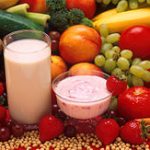 Authentic Ayurvedic dietary advices are based on a purely vegetarian diet. Although some Ayurvedic physicians advocate meat intake for people with vata constitution (prakriti) but this concept does not have good base. It is true that sage Charak has mentioned that meat is nourishing when prepared and eaten under certain circumstances (in Ayurveda text). Meat was prescribed by Charak, not as a part of meal for daily intake, but for curing disease. At this time, meat formed a small proportion of food and was obtained using traditional hunting methods and animals lived in their native habitat and natural environment. According to Charak, meat can be taken by those who are weak or convalescing and in state of dehydration or emaciation.
Authentic Ayurvedic dietary advices are based on a purely vegetarian diet. Although some Ayurvedic physicians advocate meat intake for people with vata constitution (prakriti) but this concept does not have good base. It is true that sage Charak has mentioned that meat is nourishing when prepared and eaten under certain circumstances (in Ayurveda text). Meat was prescribed by Charak, not as a part of meal for daily intake, but for curing disease. At this time, meat formed a small proportion of food and was obtained using traditional hunting methods and animals lived in their native habitat and natural environment. According to Charak, meat can be taken by those who are weak or convalescing and in state of dehydration or emaciation.
Any animal that has died a natural death, has been killed by other animal or with poisonous means, is very thin, fat, old, young, eating its meat is detrimental to heath.
Biologically humans are most suited to a predominately vegetarian diet. Human fossils studied shows that our ancestors had moderately sharp cusps like ours, were only used for cutting through foods like fruits, nuts, shoots, leaves and flowers. Carnivores have different biological features i.e. their digestive acids are stronger and their intestine are short. Human intestines are 4 times longer than those of carnivores and have weak acids.
Due to this biological feature in human, meat takes longer to digested, sometimes exceeding several days. In that time significant amount of toxicity (ama) is produced. This is a form of self poison. Due to this delay in digestion, animal protein gets sufficient time to purify in our intestinal tract. Fermentation takes place in the bowel, ultimately producing undesirable toxic bacteria and killing friendly acidophilus bacteria.
There is widespread fallacy that protein is a vital substance for our sustenance and cannot be obtained from anything other than meat. Proteins required for physical strength and good health are found in a wide variety of food. Means we can get adequate protein for good health from milk, legumes, nuts, seeds, green vegetables.
Some also say that vegetarian diet lack vitamin b12, deficiency of which may lead to fatigue, poor concentration of memory, insomnia. Vegetarian diet lack vitamin B12; this is another fallacy because sufficient amount of vitamin B12 can be obtained from milk, cheese, milk products, whole grains. One cup of milk contains 0.9 ug of vitaminB12, while one large egg contains 0.5ug of vitamin B12. So a balanced variety of vegetarian diet prevents the need of any supplements of B group of vitamins. In fact, studies have proved that vegetarians live longer and are less prone to certain cancers.
(From Ayur vision 2004)